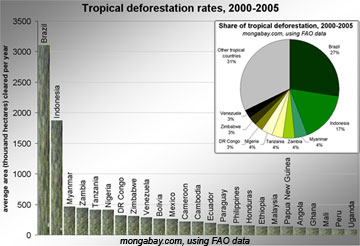Conflict in PNG between govt and landowners over REDD carbon trading
mongabay.com
November 17, 2008
|
|
The government of Papua New Guinea is facing criticism over its plan to seek compensation via the carbon market for protecting the country’s rainforests, reports Australian Broadcasting Corporation News (ABC News).
Landowners are concerned they will not see proceeds from the carbon trading mechanism the government has been instrumental in pushing at international climate talks. Under REDD (Reducing Emissions from Deforestation and Degradation), countries like Papua New Guinea would receive funds for cutting emissions that result from deforestation and land use change. The funds would come from pool of money paid into by industrialized nations. REDD has been championed by a diverse array of interests — including scientists, governments, development agencies like the World Bank, and even some conservationists — because the system has the potential to pay for rainforest conservation while delivering benefits to rural populations. But concerns remain, especially on how funds will be used and distributed. There are worries that REDD could exacerbate disputes over land, especially where title is poorly established or the government has a poor record of managing resources for the benefit of local communities. This is particularly an issue in Papua New Guinea where the government recently asserted its authority over all transactions involving forest carbon, even on private land. The position effectively blocks landowners signing private deals with carbon traders.
“The state has absolute control over the resources,” Theo Yasause, head of the Government’s new climate change office, was quoted as saying by ABC News. “Once you sign up landowners, it doesn’t give you the legitimacy, only the state has the legitimate authority… We want to deal directly with credible businesses traders who want to do business with the office and the people of Papua New Guinea.”
Landowners are alarmed by the move.
“The Government of Papua New Guinea has failed terribly in the forestry sector, the oil and gas sector,” Ken Mondiai of Partners with Melanesia, a local NGO, told ABC News.
“There is no equitable distribution of benefits coming from these resource developments and so at this early point in time, when the office of climate change is not fully set up even himself, I don’t know where he understands climate change and carbon trade.”
Mondiai, who serves as a spokesman for several NGOs working on behalf of private landholders, says landowners have little faith that the government will handle the carbon market fairly or transparently.
“We need to talk about governance as a priority. Transparency in the process of dealing with all these things,” he said. “At the moment the Government does not have policies framework for carbon trade and climate change in PNG.”
Papua New Guinea was a founding member of the “Coalition of Rainforest Nations” which formed in 2005 at climate talks in Montreal. The alliance — which is pushing for the inclusion of forest conservation in a future international climate agreement — now includes some 40 countries.
Steve Marshall. Carbon trading tension mounts in PNG. ABC News Nov 13, 2008.
Related articles
Carbon credits for forest conservation concept faces challenges
But initiative could save forests and alleviate rural poverty November 27, 2007
While environmentalists, scientists, development exports, and policymakers across the political spectrum are enthusiastic about the idea of offsetting carbon emissions by preventing deforestation (a concept known as “avoided deforestation” or Reduced Emissions from Deforestation and Degradation (REDD)), the concept still faces many challenges, especially in implementation. Issues range from “permanence” (whether a county can ensure that forest carbon savings are permanent) to “leakage” (what happens when carbon conservation in one area drives deforestation in another?) to baseline data establishment (how does one measure historic deforestation to establish a baseline for calculating reduction?). Further questions over land rights (will REDD trigger a land rush by industrial agriculture giants and forestry firms?) as well as how local communities will benefit (the cost of registering and establishing a REDD project may top $50,000, a nearly insurmountable sum for communities and small-scale forest holders in some of the world’s poorest countries) are also valid. Still, with deforestation and land use change accounting for as much as 20 percent of global greenhouse gas emissions–more than the entire transportation sector–many agree that REDD will be an important part of a global climate change mitigation strategy. With its carbon-rich forests and peatlands, Indonesia is widely seen as having the best potential for REDD initiatives.
REDD will fail if needs of forest communities aren’t addressed December 7, 2007
Initiatives to reduce emissions by reducing tropical deforestation (REDD) will fail unless policymakers adequately address the underlying drivers of forest degradation and destruction, argues a new report published by the Center for International Forestry Research (CIFOR). The report, released at the United Nations Conference of the Parties (COP-13) climate meeting in Bali, says that while REDD holds a great deal of promise, success will require sufficient financial incentives to reverse the “political and economic realities” that cause deforestation.
